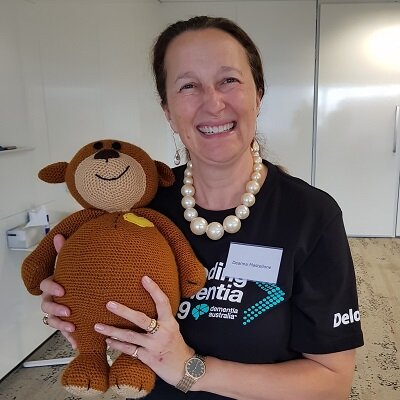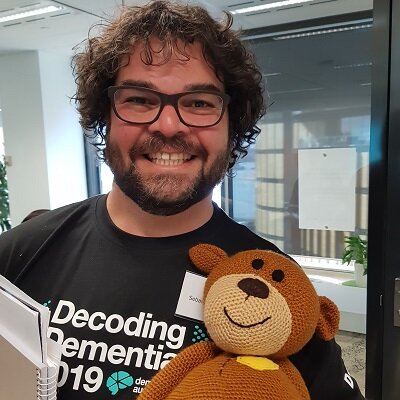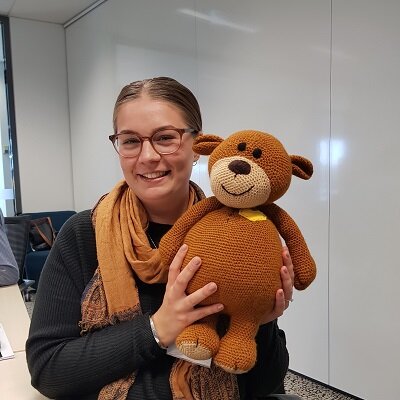Decoding Dementia: Let's play, together!
Recently we were fortunate to be accepted into a brand new program, Decoding Dementia, which encourages technology-based innovations that break down barriers for people living with dementia, their families and carers.
How do we fit in with this?
At Teach Ted, we saw opportunities to use learning through play techniques to support intergenerational connections, creating an understanding that removes the stigma which currently holds many kids and their parents back, and helping those living with dementia to share their experiences and feel purposeful and engaged.
Ted and his friends, make it fun for families with children 10 and under to learn and engage and the characters are designed to cross cultural and language borders. We would use digital videos, games and parent advice to educate and offline books, activities and toys to prompt engagement and connection.
We need your help! If you know of a corporate, philanthropic or family office who is looking for clever ways to help families affected by dementia, we’d love an introduction. Keep reading for more on how together we can make this happen or click here to get in touch.
Read on for more of our journey through the Program and our final solution, Ted’s Funny Bunny.
Decoding Dementia 2019 was led by Australia’s leading advocacy group in this space, Dementia Australia, funded by Department of Health and delivered by Deloitte Australia.
The 20 semi-finalists were chosen by Dementia Australia as well as people living with dementia and their carers, based on their likelihood to solve actual problems faced by families affect by dementia and the innovative use of technology to scale these solutions.
The program was split into two parts:
Semi-finals: A series of webinars and two day workshop of presentations and interactive sessions with Deloitte, Dementia Australia and Dept of Health teams as well Dementia Advocates (those living with dementia or caring for them). The workshops gave us valuable insight into the practical realities and challenges faced as well as how to successfully design, build and articulate our solutions. This stage culminated in a 5 minute live pitch of our concept.
Finals: Following Stage 1, 12 teams were selected to move through to the finals which included webinars to help us prepare, engagement with Dementia Advocates to further flesh out our concepts and then a 5 minute pitch to judges and invited guests.
The power of involving your ideal customers in design
For all of our products, we co-design our solutions with both experts and families who might use our tools. Whilst we have our own lived experiences, we want to ensure our final solutions are going to work for a wide range of families and are built on deep knowledge within the area we are looking to support.
The workshops(?) were a great opportunity to share our initial concept with the team from Dementia Australia and Dementia Advocates. Hearing personal stories from their day to day lives, the impact that a dementia diagnosis has and what they’d like to see done differently really helped us to test our initial concept.
Dementia Advocates Deanna, Sebastian and Alice
Here are some of the key messages we heard in the workshops and webinars that really helped us:
70% of people living with dementia are cared for at home.
It’s important to keep socially engaged and maintain a level of independence.
Each person is different so universal solutions are not the right answer.
Carers already have a lot to deal with so solutions need to be easy to access and use.
Both the people living with dementia and those caring for them felt that a lot of the fun was taken out of their lives following a diagnosis.
Families want to stay connected but sometimes they don’t know how. Parents can be unsure about how to explain things to their kids which can lead to reduced contact.
It’s usually only the adults who are concerned about changes in behaviour that are outside social norms whereas kids have a beautiful talent to innately accept that you are a person in your own right.
Based on this feedback and additional conversations with Dementia Advocates after the workshops, we evolved our design to:
Make sure that our solution worked for parents of young children, as they are the key drivers to make intergenerational play happen, and provide practical techniques to manage potential problems or roadblocks.
Act as a starting point for engagement and real-life interactions, directing users to existing education tools around the various types and stages of dementia rather than ‘reinventing the wheel’.
Keep the focus on ways that people living with dementia and younger loved ones could successfully engage and provide practical tips to address the concerns that may currently discourage interactions.
Offer tools in a range of formats (both online and offline) to allow for differences in needs and abilities.
Meet Ted’s Funny Bunny
We have created a new character, Grandma Bunny, who is Ted’s grandmother. We came up with the name after hearing Dementia Advocate, Julianne’s story about how she explained her husband’s dementia symptoms to her grand-daughter.
Our proposed solution includes:
Short videos and augmented reality games that explain at a high level what dementia is, how it might change someone’s behaviour and a few different activities that might be fun to do together, such as creating a photobook and hearing stories behind each photo.
A hard copy book to encourage intergenerational engagement – snuggle time and reading together. We know from our existing tools that this encourages more open discussions - children are able to speak ‘through Ted’, voicing their feelings more freely than if talking directly to an adult.
Handmade Ted toys provide a great focal point for intergenerational connection, can be a comfort if days aren’t so good and is a wonderful keepsake for children if their loved one passes away.
Advice and discussion points providing background information, discussion starters and fun offline activities which can be used by parents, teachers and care providers.
Templates to encourage children to share their stories as part of school news time to build broader awareness and reduce community stigmatisation of dementia.
We design for accessibility, which you can see through our colours, choice of platforms and multilayered approach, telling stories through pictures, spoken and written word.
Imagine how our solution can change the world for families
When Henry goes to visit his grandma who's living with dementia, instead of not being prepared for not being recognised, his parents have been using our online and offline tools so he knows this might happen and what he can do. He has the opportunity to maintain a close relationship with his grandma and build valuable memories while she feels purposeful and connected. This brings with it the added benefit that Henry’s parents don’t have the added stress of finding carers every time they want to visit and are freed from the guilt many have told us they felt about keeping loved ones apart.
Research-based approach
As a Board member with Playgroup Victoria, Sarah is already well across the benefits of intergenerational play in the general community. If you haven’t already watched ‘Old People’s Home for 4 Year Olds’, created by ABC in conjunction with Playgroup Australia, we would highly recommend it. The benefits to both the residents of the aged care facility and the children were many, including increased independence, reduced depression and medication rates and improved strength for the adults and improved language and empathy for the children.
The learnings we have gained from this program have helped to inform our approach, whilst tailoring to meet the unique needs of families living with dementia where cognitive and physical changes can be significantly different to those of general aging.
Where to now?
The pitch judging panel included people from Dementia Australia, residential care providers and industry experts. They loved our concept of bringing fun back into people’s lives and creating tools that could be used by everyone regardless of where they lived or their care needs. They also saw how our solution could help to address the issues caused by societal stigmas and help those from non-English speaking backgrounds.
Whilst we weren’t selected as one of final four, we received lots of positive feedback from judges and audience alike. Dementia Advocates told us that they’d love to see our solution brought to life and are keen to continue to co-design with us. So now all we need is our first customer!
We need your help!
If you know of a corporate, philanthropic or family office who is looking for clever ways to help families affected by dementia, we’d love an introduction.
By supporting the development and distribution of our solution, our customers are helping to change the way dementia is perceived and improve the lives of those living with dementia or caring for them.
As well as becoming a customer, there are opportunities for:
Foundation Partner status
Sponsorship rights of some of our free-to-users videos
Profit share options for co-design, branding and distribution partners
As with all of our resources, we will again be providing free resources through our donation partners. This is baked into retail sales of our online and offline tools.
The benefits are clear – by reducing the anxiety caused by lack of understanding, more connections happen. Those living with dementia have improved mental and physical wellbeing and progression of care needs slows. These also drive cost benefits for families, care providers and the broader health ecosystem.





